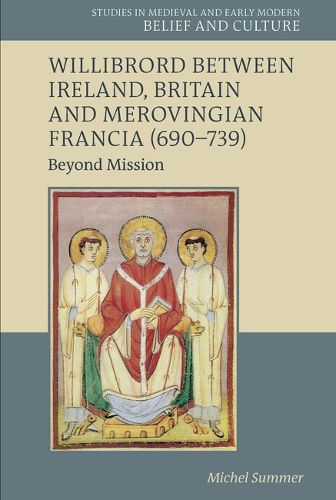Readings Newsletter
Become a Readings Member to make your shopping experience even easier.
Sign in or sign up for free!
You’re not far away from qualifying for FREE standard shipping within Australia
You’ve qualified for FREE standard shipping within Australia
The cart is loading…






The century between c. 650 and 750 was one of major religious, social and political transformations in northwest Europe. In the Frankish kingdom, clerics from Ireland and Britain played an important role in these processes. One of the most prominent figures to emerge from this period was Willibrord - a Northumbrian educated in Ireland who became the first bishop of Utrecht and founded the monastery of Echternach in modern Luxembourg. Through his involvement in the Christianisation of Frisia, his cooperation with the eastern Frankish elite, including the ancestors of Charlemagne, and his connection with the pope, Willibrord was at the centre of the developments which led to the formation of a new ecclesiastical and political landscape between the North Sea and Thuringia on the eve of the Carolingian period. This book, which represents the first extensive study of the topic in English, extends its analysis of Willibrord's career beyond the mission to Frisia and examines the political dimension of his activity in Merovingian Francia and its border regions. By offering a fresh look at the main sources for Willibrord's life, the book explores how Insular clerics shaped their Frankish environment through the creation of networks between Ireland, Britain and the continent and their ability to take on a variety of different roles within Merovingian society.
$9.00 standard shipping within Australia
FREE standard shipping within Australia for orders over $100.00
Express & International shipping calculated at checkout
The century between c. 650 and 750 was one of major religious, social and political transformations in northwest Europe. In the Frankish kingdom, clerics from Ireland and Britain played an important role in these processes. One of the most prominent figures to emerge from this period was Willibrord - a Northumbrian educated in Ireland who became the first bishop of Utrecht and founded the monastery of Echternach in modern Luxembourg. Through his involvement in the Christianisation of Frisia, his cooperation with the eastern Frankish elite, including the ancestors of Charlemagne, and his connection with the pope, Willibrord was at the centre of the developments which led to the formation of a new ecclesiastical and political landscape between the North Sea and Thuringia on the eve of the Carolingian period. This book, which represents the first extensive study of the topic in English, extends its analysis of Willibrord's career beyond the mission to Frisia and examines the political dimension of his activity in Merovingian Francia and its border regions. By offering a fresh look at the main sources for Willibrord's life, the book explores how Insular clerics shaped their Frankish environment through the creation of networks between Ireland, Britain and the continent and their ability to take on a variety of different roles within Merovingian society.